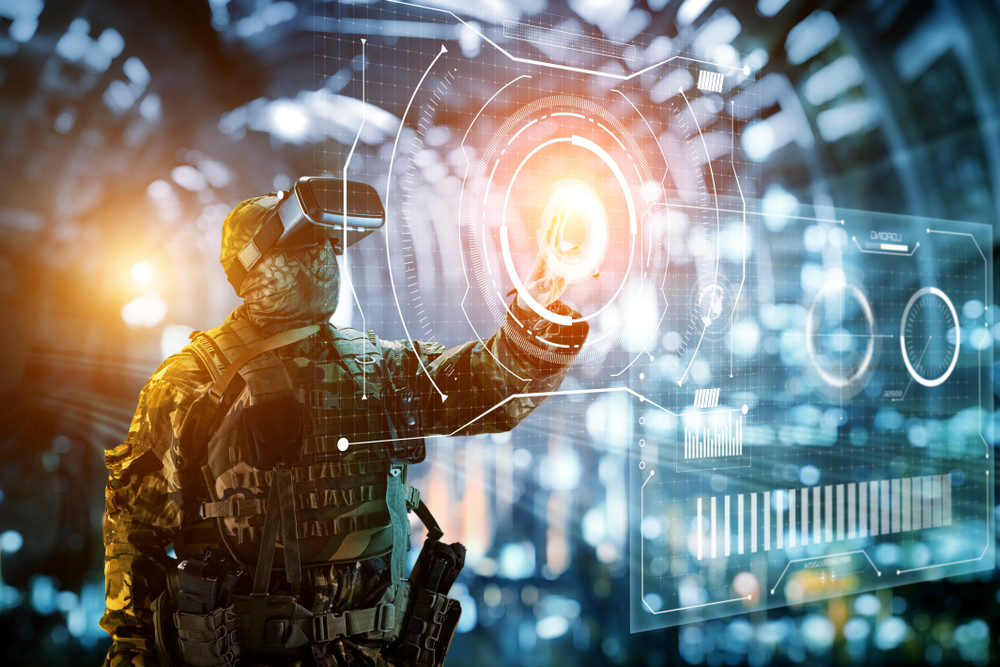Introduction: In recent years, integrating artificial intelligence (AI) into military operations has become a critical component of global security policies. The combination of cutting-edge technology and military prowess has created new opportunities, but it also presents considerable challenges. In this post, we will look at the future of artificial intelligence in military warfare and discuss the challenges that lie ahead.
The Role of AI in Military Warfare:
Artificial intelligence in military applications encompasses a wide range of technologies, from autonomous vehicles to advanced decision-making algorithms. The integration of AI into military systems promises enhanced efficiency, accuracy, and strategic capabilities. Autonomous drones, for instance, can carry out reconnaissance missions and execute precision strikes with minimal human intervention. AI algorithms can analyze vast amounts of data in real-time, enabling faster and more informed decision-making on the battlefield.
Challenges on the Horizon:
Despite the promising potential, the future of AI in military warfare is not without its challenges. Several concerns loom large, presenting obstacles that must be addressed to ensure responsible and ethical use of these technologies.
Ethical Considerations:
As AI systems become more autonomous, ethical concerns surrounding their use in warfare intensify. Questions about the morality of allowing machines to make life-or-death decisions, potentially devoid of human empathy, raise alarms. Striking the right balance between autonomy and human oversight is a paramount challenge.
Security Risks:
The integration of AI introduces new security risks. The susceptibility of AI systems to hacking and manipulation poses a serious threat. Ensuring the robustness and cybersecurity of military AI systems is crucial to prevent unauthorized access and manipulation by malicious actors.
Legal and Regulatory Frameworks:
The development and deployment of AI in military operations outpace the establishment of clear legal and regulatory frameworks. The absence of international agreements on the use of AI in warfare leaves room for ambiguity and potential misuse. Establishing guidelines and regulations is imperative to prevent the uncontrolled escalation of AI-driven conflicts.
Job Displacement and Economic Impact:
The widespread adoption of AI in the military may lead to job displacement, particularly for those involved in traditional military roles. Additionally, the economic impact of investing heavily in AI technologies for defense purposes raises questions about resource allocation and societal priorities.
Bias and Discrimination:
AI algorithms are only as unbiased as the data they are trained on. The potential for biases and discrimination in military AI systems, especially in decision-making processes, is a significant concern. Efforts must be made to ensure fairness and equity in the development and deployment of these technologies.
Conclusion:
The future of artificial intelligence in military warfare is a double-edged sword, offering unparalleled advantages while presenting complex challenges. Striking a balance between harnessing the potential of AI and addressing ethical, security, and societal concerns is crucial. The collaboration of international communities in establishing clear guidelines and regulations will be instrumental in shaping a future where AI in military operations is not only powerful but also responsible and accountable. As we navigate this uncharted territory, careful consideration of the challenges ahead will pave the way for a future where AI complements human capabilities, ensuring a safer and more secure world.
What is the current role of artificial intelligence in military warfare?
Answer: Artificial intelligence is currently employed in various military applications, including autonomous drones, decision-making algorithms, and data analysis tools. These technologies enhance efficiency and strategic capabilities in modern warfare.
What ethical concerns surround the use of AI in military operations?
Answer: The ethical concerns include the morality of allowing machines to make life-or-death decisions, potential lack of human empathy in autonomous systems, and the need for a balance between autonomy and human oversight to ensure responsible use of AI in the military.
How does the integration of AI in military systems impact cybersecurity?
Answer: The integration of AI introduces new security risks, as AI systems become susceptible to hacking and manipulation. Ensuring the cybersecurity of military AI systems is crucial to prevent unauthorized access and potential misuse by malicious actors.
Are there any international agreements or regulations regarding the use of AI in warfare?
Answer: Currently, there is a lack of clear international agreements on the use of AI in warfare. The absence of regulatory frameworks raises concerns about the potential for ambiguous and uncontrolled escalation of conflicts driven by AI technologies.
What are the potential societal impacts of widespread AI adoption in the military?
Answer: The widespread adoption of AI in the military may lead to job displacement, particularly for those in traditional military roles. Additionally, the economic impact of investing heavily in AI technologies for defense purposes raises questions about resource allocation and societal priorities.


